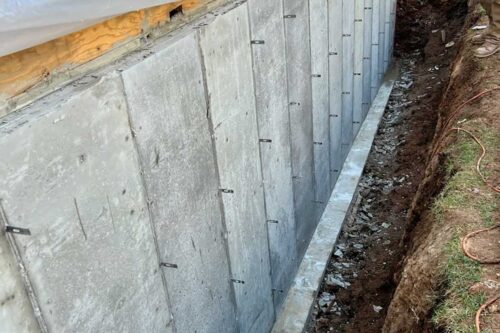
A strong and stable foundation is the backbone of any home. In St. Louis, where soil conditions and seasonal weather changes can wreak havoc on building structures, preventing foundation cracks is essential. Cracks in your foundation can range from minor cosmetic issues to serious structural foundation cracks and problems that compromise the safety and value of your home.
At Cornerstone Structural Repair & Waterproofing, we specialize in proactive and long-term solutions to protect your foundation. Backed by our life-of-structure warranty, our services give homeowners peace of mind knowing their home is built to last. This guide offers practical tips and expert insights into preventing foundation cracks before they start.
To learn more or schedule foundation crack repair services in St. Louis, contact our experts today.
Why Foundation Cracks Occur
Understanding the root causes of foundation cracks is the first step in prevention. In the St. Louis area, several factors contribute to foundation issues:
Expansive Clay Soil
St. Louis is known for its clay-rich soil, which expands when wet and contracts when dry. This constant shifting puts pressure on your foundation and can lead to cracking over time.
Seasonal Weather Changes
Freeze-thaw cycles in winter and hot, dry summers can cause the ground to move, making your foundation vulnerable to cracking.
Poor Drainage
When water accumulates around the base of your home, it can weaken the soil and cause foundation movement. Improper gutter placement, clogged downspouts, and poor grading are common culprits.
Tree Roots and Landscaping
Large trees planted too close to your home can absorb moisture from the soil, causing it to shrink. Invasive root systems can also push against the foundation.
Construction Issues
Poor initial construction, inadequate footings, and use of low-quality materials can increase the risk of foundation cracking.
Best Practices for Preventing Foundation Cracks
Preventing foundation cracks requires a combination of moisture control, structural reinforcement, and routine maintenance. Here are some of the most effective strategies:
1. Maintain Consistent Soil Moisture
Avoid extremes in soil moisture by watering your foundation area during dry spells and ensuring it doesn’t get oversaturated during wet seasons. A soaker hose set a few feet from the foundation can help maintain even moisture levels.
2. Install Proper Drainage Systems
Gutters and downspouts should direct water at least five feet away from your home. If your property has drainage issues, consider installing French drains, surface drains, or a sump pump system.
3. Grade Your Yard Away from the Foundation
Your yard should slope away from your home to encourage water runoff. This reduces the risk of water pooling near your foundation, especially during heavy rains.
4. Avoid Planting Trees Too Close
Choose tree species with non-invasive roots, and plant them a safe distance from your foundation. As a general rule, trees should be planted at least as far away from your house as their mature height.
5. Monitor Cracks and Changes
Not all cracks indicate a serious issue, but they should be monitored. Use a pencil or measuring tape to check if cracks are growing. If you see widening gaps, bowing walls, or doors and windows that stick, it may be time to call a professional.
6. Reinforce Vulnerable Areas
For homes already showing signs of stress, wall anchors, carbon fiber straps, or pier systems can help stabilize and protect the structure.
7. Waterproof Your Basement
Basement waterproofing helps prevent excess moisture from accumulating in the soil around your home. Interior drainage systems, vapor barriers, and waterproof coatings all reduce the risk of foundation movement.
Long-Term Benefits of Preventative Maintenance
Preventative foundation care is not just about avoiding costly repairs. It also enhances the overall value, safety, and lifespan of your home. Homebuyers in St. Louis appreciate knowing that a home has been properly maintained and that the foundation is protected by a life-of-structure warranty like the one offered by Cornerstone.

FAQs About Preventing Foundation Cracks
Can small cracks in my foundation be ignored?
Small cracks may seem harmless, but they can widen over time or allow moisture to enter. It’s best to have them inspected by a professional.
How often should I inspect my foundation?
We recommend doing a visual inspection every season, especially after heavy rains or extreme weather changes.
Is it expensive to install drainage solutions?
The cost depends on the severity of the issue and the type of system needed, but the investment in basement French drains and other drainage solutions is minimal compared to major foundation repairs.
Does landscaping really affect my foundation?
Yes. Poor landscaping practices, like overwatering or planting large trees near the house, can significantly increase the risk of cracking.
What are the signs I need professional help?
Look for signs of foundation movement like uneven floors, sticking doors or windows, widening cracks, or water seepage in the basement.
Call Cornerstone for Proven Foundation Solutions in St. Louis
If you’re concerned about preventing foundation cracks or have noticed warning signs around your home, don’t wait. Early intervention can save thousands in repair costs and ensure your home remains safe and stable.
At Cornerstone Structural Repair & Waterproofing, we bring decades of experience, expert craftsmanship, and a commitment to customer satisfaction. Every repair is backed by our life-of-structure warranty, giving you confidence and peace of mind.
Contact us today to schedule your free inspection, request a foundation repair or basement waterproofing quote and discover how we can help you protect your home from future foundation problems.

